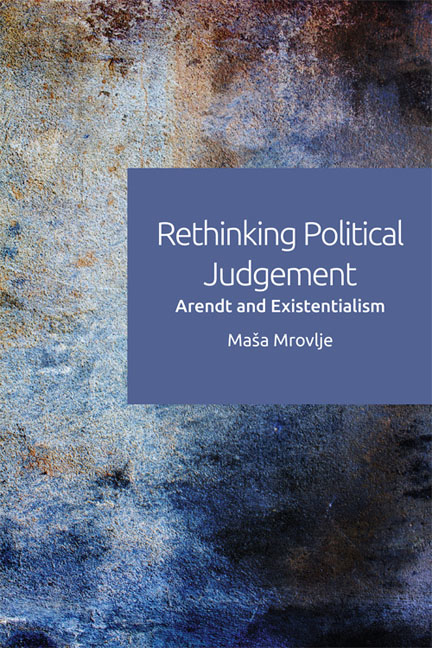Book contents
- Frontmatter
- Contents
- Acknowledgements
- Introduction
- 1 Political Judgement in the History of Political Thought and the Modern Crisis
- 2 Sartre and Beauvoir: The Ambiguity of Political Judgement and the Challenge of Freedom and Responsibility
- 3 Camus and Arendt: Confronting the Ambiguity of Political Judgement and Illuminating the Limits of the World
- 4 Political Judgement and Narrativity
- 5 Facing Up to the Tragedy of Political Action: The Problem of Dirty Hands
- 6 Times of Transition: Reconciling with the Tragic Nature of Political Affairs
- Conclusion: Reclaiming Wonder at the World of Political Affairs
- Bibliography
- Index
4 - Political Judgement and Narrativity
- Frontmatter
- Contents
- Acknowledgements
- Introduction
- 1 Political Judgement in the History of Political Thought and the Modern Crisis
- 2 Sartre and Beauvoir: The Ambiguity of Political Judgement and the Challenge of Freedom and Responsibility
- 3 Camus and Arendt: Confronting the Ambiguity of Political Judgement and Illuminating the Limits of the World
- 4 Political Judgement and Narrativity
- 5 Facing Up to the Tragedy of Political Action: The Problem of Dirty Hands
- 6 Times of Transition: Reconciling with the Tragic Nature of Political Affairs
- Conclusion: Reclaiming Wonder at the World of Political Affairs
- Bibliography
- Index
Summary
Drawing on the perspectives of the four selected existential thinkers, the preceding two chapters brought out the paramount political import of reinvigorating the human judging ability as a worldly, ambiguous practice. Their attempts to confront the realities of their time led them to question the barriers between the realms of ethics and politics on the one hand and the realm of aesthetics on the other, and to rethink political judgement on the model of aesthetic sensibility. In this reconsideration they prefigure the recent turn within political theory towards narrative as a promising prism through which to confront the ethical and political perplexities of contemporary times. Thinkers as diverse as Martha Nussbaum, Richard Rorty and Paul Ricoeur all dwell on the boundaries of the traditional distinction between political theory and literature, and insist that our capacity for practical judgement could be greatly enriched by an engagement with literary works. Literary imagination is praised for its ability to displace the traditional understanding of the human judging ability as an abstract exercise in the application of universal standards. It foregrounds political judgement as a reflective activity of recognising others and worldly events in their particularity, and of stimulating our capacity for an adequate response. This narrative about narrative, however, has not remained uncontested. Critics warn against awarding narrative too presumptuous a role. Questioning the very ability of narrative that is praised among its supporters, they point to the troubling political implications of narrative empathy. While a nuanced recognition of the political and ethical import of narrative discourse can be traced as far back as the ancients, then, it seems to have acquired a new and, as it were, urgent relevance in contemporary political thought.
This chapter explores how the existentialists’ narrative sensibility maps onto this broader space of the vigilant, yet contested turn towards narrative as a way of facilitating political judgement. In this examination, it refrains from assuming the ethically and politically beneficial effects of narrative voice. It draws on the four thinkers’ aesthetic accounts of the situated process of judging to foreground the political relevance of narrative at the deepest existential level. It understands narrative not as a conveyor of any specific truth content or way of reasoning, but a mode of interaction and understanding aimed at making sense of human worldly experience.
- Type
- Chapter
- Information
- Rethinking Political JudgementArendt and Existentialism, pp. 115 - 145Publisher: Edinburgh University PressPrint publication year: 2017



